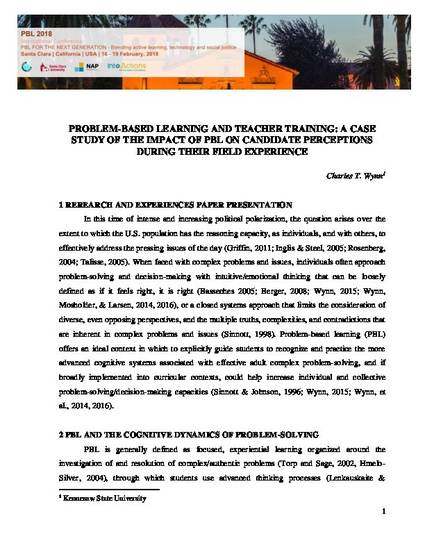
Presentation
Problem-Based Learning and Teacher Training: A Case Study of the Impact of PBL on Candidate Perceptions during their Field Experience
PBL For the Next Generation - Blending active learning, technology and social justice
(2018)
Abstract
In this time of intense and increasing political polarization, the question arises over the extent to which the U.S. population has the reasoning capacity, as individuals, and with others, to effectively address the pressing issues of the day (Griffin, 2011; Inglis & Steel, 2005; Rosenberg, 2004; Talisse, 2005). When faced with complex problems and issues, individuals often approach problem-solving and decision-making with intuitive/emotional thinking that can be loosely defined as if it feels right, it is right (Basseches 2005; Berger, 2008; Wynn, 2015; Wynn, Mosholder, & Larsen, 2014, 2016), or a closed systems approach that limits the consideration of diverse, even opposing perspectives, and the multiple truths, complexities, and contradictions that are inherent in complex problems and issues (Sinnott, 1998). Problem-based learning (PBL) offers an ideal context in which to explicitly guide students to recognize and practice the more advanced cognitive systems associated with effective adult complex problem-solving, and if broadly implemented into curricular contexts, could help increase individual and collective problem-solving/decision-making capacities (Sinnott & Johnson, 1996; Wynn, 2015; Wynn, et al., 2014, 2016).
Disciplines
Publication Date
February, 2018
Location
Santa Clara, CA
Citation Information
Charles T Wynn. "Problem-Based Learning and Teacher Training: A Case Study of the Impact of PBL on Candidate Perceptions during their Field Experience" PBL For the Next Generation - Blending active learning, technology and social justice (2018) Available at: http://works.bepress.com/charles-wynn/6/
